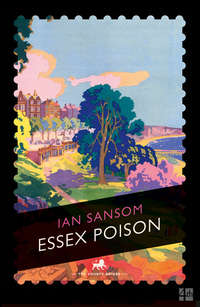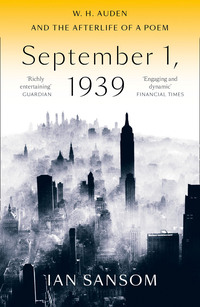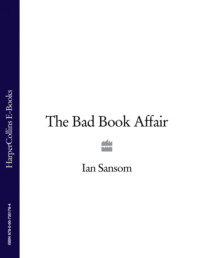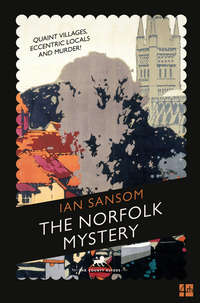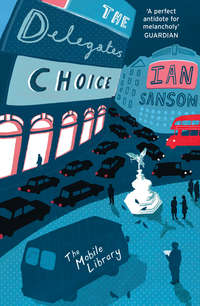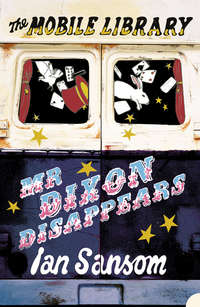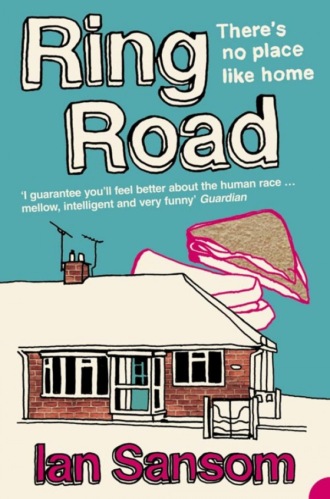
Полная версия
Ring Road: There’s no place like home


RING ROAD
There’s no place like home
IAN SANSOM

For my family
Contents
Cover
Title Page
Preface
1 The Seventh Son
2 Sandwiches
3 Jesus, Mary and Joseph
4 The Dump
5 Fellowship
6 Massive
7 Plumbing
8 The Steam Master
9 Closure
10 Print
11 The Quality Hotel
12 Unisex
13 Deep Freeze
14 Self-Help
15 Line Dancing
16 Speedy Bap!
17 Condolences
18 The Bridal Salon
19 Country Gospel
20 Cigars
21 Christmas Eve
Index of Key Words, Phrases and Concepts
Acknowledgements
P.S. Ideas, interviews & features …
About the author
Q & A
Life at a Glance
Favourite Books/Authors
About the book
A Critical Eye
Sandwich Spread
Read on
Have You Read?
If You Loved This, You’ll Like …
Find Out More
By the same author
Praise
Copyright
About the Publisher
Preface
Containing the customary avowals, apologies, concealments of artistry, confidences, explanations and precepts, and a note on the tipping of winks
I worked on a farm once, when I was first married, in County Antrim, and one of the men I worked with had been in London doing the roads, during the early Seventies, at the beginning of the Troubles, and he claimed that things were so bad in those days that he would post ham in an envelope back home to his family in Belfast. I was never sure if he was having me on or not – it’s always difficult to tune in to another nation’s sense of humour, and I was an Englishman abroad – but I always thought it was a nice idea, and I like to think of this book as similar in some way, as the equivalent of some ham in an envelope, posted in reverse, from me here to you elsewhere, wherever you are. It’s probably like ham in other ways too, some people would say.
When I published my first book, The Truth about Babies (Granta, 2002), my wife said she’d only read the next one if I managed to make no mention of vomit, diarrhoea, urine, sperm and other bodily fluids, and I’ve done my best, although she may wish to skip a few pages… The index is designed for those with similar aversions or inclinations.
When I sent my mum a copy of the baby book she said, ‘That’s nice, dear,’ which is pretty much what she’s said to me since I first brought drawings home from school, and which still seems to me about the right response to anyone claiming to be an artist. These days, reticence is easily underrated. But then so is enthusiasm. When we were growing up my mum and dad provided for us children, they cooked good food for us to eat, they made sure we brushed our teeth and were polite, and didn’t watch too much television, they taught us how to make our own beds, helped us with our homework and pointed out interesting things when we were on long car journeys. Perhaps this last explains the footnotes.
The rest of the mechanics of the book are obvious, I hope, and require no further admissions or explanation. (Apart, perhaps, from the brief chapter summaries and epigraphs, which seem to me a mere practical courtesy but which I’m aware are currently out of fashion, and so may seem avowed and unusual rather than commonsensical or natural, like wearing spats, or clogs, or a smock. But fashions come and go – maybe if you keep the book in a cupboard in a few years’ time it’ll all be back in again.)
Writers are, of course, wilful and selfish individuals who only get away with writing because other people allow them the privilege, but I know from long experience that listening to writers saying their thank yous is a bit like listening to people pray or talking about sex – it’s not necessarily unpleasant and everyone does it sometimes, but you do wonder if maybe they could learn to do it in their own heads and in the privacy of their own homes. So I have left all my acknowledgements until the end. They are an apology as much as an explanation.
Anyway, I do hope you enjoy the book – it’s meant for you to enjoy. It would be presumptuous of me to say what it’s all about, or even to pretend that I know, although maybe you’ll understand if I say that as a child on summer evenings, on Sundays, our parents would often have relatives over for tea – this was before barbecues had arrived and when family lived close by – and my aunts and uncles would come and we would sit around the dining table, which now serves me as a desk, and we would eat sandwiches and salads, and we would talk and play games, and I would fight with my cousins, and I can remember that I was amazed that these people were supposed to be my relatives, people with whom I seemed to have nothing whatsoever in common. It was a long and painful lesson, undiminished even by crab paste and trifle, and I thought it would be good to write a book that somehow reflected those Sunday teatimes, and which would remind me of the many different ways in which people live their lives, which is what makes our lives possible.
It would be self-serving of me to say anything else, except perhaps that the town is not meant to be a replica of any particular place, although I believe it does exist, and that I’ve never met any of the people, although there are equivalents, and that each chapter can be read on its own as well as in relation to all the others, although I hope, of course, that you’ll read them all. There are no themes that I’m aware of and any obscurities are unintentional.
It seems necessary, finally, to apologise to the busy reader for this, a preface, which suggests either an uncertainty or an unnecessary formality on the part of the author, or perhaps both. Writers are traditionally opposed to explanation, since it diminishes the effect of the masterly voice and style, but I have always found it a hardship not to be helpful, which is a failing, I know, but it’s still better, I think, even now, with the effects of excess everywhere apparent, to be told too much rather than too little. Arrogance, bullying, puffery, rapacity, self-awe and the tipping of winks can get you a long way in life, and it seems to get a lot of authors further than most, but in the end I believe it’s better simply to be honest and to try to be explicit. And if you can’t be, you should at least try and pretend.
Thank you, again.
Bangor – Belfast – Donaghadee, 2003
1 The Seventh Son
In which there is scenery and Davey Quinn returns to his home town, with some considerable determination, and is shocked at what he finds
‘That’s some weather we’ve been having.’ That’s what people say where I come from, when they don’t know what else to say, which is most of the time.
Once we get going we’re OK, but it can take us a while to warm up to a conversation – about five years is the average. In fact, in most instances conversation never quite catches fire, but that doesn’t stop us laying down the kindling, stating our good intentions, preparing for something that in all likelihood may never happen. We may never get round to the big blaze, we may never exchange a confidence or share a secret or speak out of turn, not even when fuelled by drink, which tends to leave us speechless and starry-eyed, stupefied rather than garrulous and overflowing, but still every day we will happily talk about the weather, and about our children, and about births and deaths and marriages, and thus recently, of course, about the return of big Davey Quinn, after nearly twenty years away.
Davey is famous in our town because he is the seventh son of a seventh son, which is a rare distinction anywhere but nothing short of a miracle here, where the population has been growing for as long as anyone can remember but where the family size is getting smaller – these days a seventh son seems not so much a hopeless indulgence as a sheer impossibility, or an embarrassment, even among the most devout of the dwindling and ageing congregation at the Church of the Cross and the Passion, where Davey’s parents still attend regularly and still give thanks for the fact of his wonderful birth, long after the event.
Davey, needless to say, does not share his parents’ enthusiasm and never has done. His is a distinction that he did not earn, and did not ask for, and it has proved to be a heavy burden for which he was quite unprepared. It would probably be fair to say that Davey Quinn has found his position in life more difficult to bear than most: his fame has taken its toll. The famous photographs that appeared in the local paper, the Impartial Recorder, can still be found framed in pubs and bars around town, places that like to fill their walls with the faces of local celebrities, as a warning and a witness, perhaps, to the meaninglessness and transitoriness of human life, for who now remembers our champion high-diver, Don Kennedy, who competed at the 1936 Munich Olympics, and who walked around town on his hands every morning and did marathon push-up demonstrations in the old market place (which is now the multi-storey)? Or even Barbara McAlesee, the Impartial Recorder’s ‘Woman of the Week’ as recently as 1979, who knitted scarves and hats from the fur of dead pets, and who appeared on the once popular Sunday night television programme That’s Life, and who exists now only in a faded newspaper cutting behind the counter at Scarpetti’s, alongside an example of her handiwork, a muffler, framed, made from the fur of the late Mrs Scarpetti’s terrier, Massimo? Or the McLaughlin brothers, the tap-dancing twins who danced their way out of town and into Broadway success in the chorus of the musical Hold on to Your Hats in 1943, which starred Al Jolson and Martha Raye singing ‘She Came, She Saw, She Cancanned’?
The most popular and much reproduced photograph of Davey shows him with his eyes sealed shut, wrapped tight in a blanket and stranded in the arms of his suited and black-spectacled father, with his six brothers in duffel coats and parkas crowding around in front, looking utterly fed-up, standing outside the old cottage hospital – formerly the soap-works – on Union Street, which is where all the Quinn brothers were born, two generations of them, and which is long since demolished, which has made way for an extension to what used to be the Technical College and is now the Institute of Higher and Further Education, and which may some day become a university, if the Principal, Hugh Scullion, has his way, which he usually does.*
From this great seat of learning, then, what was once that little cottage hospital, Davey Quinn made not only our local news, but the national news, and the international – within a week of his birth he had straddled the globe as evidence of God’s amusement and of the wonder of fornication. The midwife’s slap – Miss Carroll’s, as it happens, a lovely, jolly woman, who committed suicide a few years ago, the day after her retirement, a terrible tragedy and a loss which was felt by the whole town, many of whom she had brought to life with her own bare hands, with her renowned firm slap – and Davey’s cold cry seemed to carry from earth to heaven, and far across land and sea, as far, they say, as America, where his tiny features could be seen on news-stands from state to state and on the televisions of the nation.
These days parents might grow rich on the proceeds of such an extraordinary birth, but back then we were all innocent and little Davey was not regarded as a commodity – he was, rather, and to all of us, a gift. A commodity can at least be bought and sold – it is a free exchange. But a gift implies obligations: it is therefore difficult to refuse or to return. Poor Davey, the runt of the litter, a little miracle, an excitement in all four corners of the globe, was the fulfilment of a life’s ambition for his father, Davey Senior, as he became known, and he was therefore, naturally, a huge disappointment to him and hence to himself. Babies, if only they knew the dismal realms they were about to enter, would probably never heed the call and never leave those remote gold and silver coasts from whence they come and have their lodgings. They would pause, consider the darkness, and sit right back down again on their fat little hunkers and never cross the waters into memory and oblivion. Surely no being rushes to embrace its own apotheosis? Unless, of course, that being be man.
Some years ago Davey left to travel the world and to try to escape his unique privilege and responsibilities, to try to escape photographs of himself in pubs and bars, to find riches and even, perhaps, he told himself then, believing such to be possible, to find himself. He got as far as London, where no one believed him – they thought he was joking – if he told them he was the seventh son of a seventh son, even if they stayed around long enough to hear him tell, which was not often and certainly never when he or they were sober or during the hours of daylight, and so in the end it ceased to matter. The wonderful and the terrible, his colossal, inescapable self, became first hilarious and then irrelevant, and finally unmentionable. He found refuge in work and in friendships, and in all the usual and time-honoured traditions. He drank the cup to the lees and there was a vast blur, and in the crowd he became successfully, magnificently anonymous. Among the millions of other talebearers, he lost himself and disappeared.
I don’t know the exact circumstances which brought him to the point of return – there are rumours, of course – but he’s back and it’s good to have him back, and what people are saying is this.
He woke up, they say, and urinated bright red, which was a shock, I guess. Urine is usually yellow, wherever you’re from and wherever you’re living; it is one of life’s few constants, sometimes perhaps a little darker, sometimes perhaps a little lighter, but always yellow, even for the likes of little Annie Wallace and her family, and the Buckles, and the Hawkinses, and the Delargys, our town’s Jehovah’s Witnesses, who have long since forsaken the wicked pigmenting tints of tea and coffee and alcohol, and birthdays, yet whose holy and clean-living wee is still distinctly yellow. Davey Quinn’s urine that morning was a red-wine kind of a red, a welcome colour in a fine-cut crystal glass over a nice evening meal in a favourite restaurant, but never good on porcelain first thing in the morning, and so it was that Davey decided that it was time to come home. He’d been away long enough. His kidney was ruptured. They’d read him his last rites in the hospital, apparently, but he was out and about and fighting fit six weeks later – Davey is nothing if not a fighter – and the very next day he booked his ticket home.
He made it back via our so-called International Airport, which, it has to be said, is not noticeably International – there are tray bakes on sale in the gift shop, for example, and more copies of the Impartial Recorder than there are business books in the newsagent – but it has a reciprocal arrangement with a similar airport in the south of France and there’s a flight once a week, to and from, which grants them both their titles.
So Davey made it back safely and in some style, but alas his luggage did not make it. It’s always touch and go flying in here, whether you’ll arrive with what you left with. Most of us in our time have lost something in transit, even if it’s only our nerves or our resolve, usually because of the final descent, which requires a steep bank round and a sudden drop of altitude, when suddenly you see home and your stomach is in your mouth and you realise exactly how tiny it is, how small, your town, and your street, and your little house in your little street, how insignificant in the great scheme of things: it can be a sobering experience for someone just returning from business, or a weekend shopping trip or visiting relatives in a city, full of themselves and the complimentary drinks and the bag of nuts. Cities exist in and of themselves, and require no explanation, they just are. In a city you can kick back and relax, and you need only concern yourself with questions of who you are and what you are, and how you’re going to be more, and bigger, and better: if you’d ever attended the Philosophy for Beginners evening classes with Barry McClean at the Institute you would probably have called these empirical questions of essence and existence.* A city, in other words, makes you a utilitarian. But when you look at our town you just straight away think to yourself: why? A small town can make you metaphysical.†
Marie Kincaid, who lives in town and who commutes up to the airport, sees people facing up to this question every day, as they step off planes on to the tarmac and into the drizzle, and wonder exactly how they got here and whether there might possibly be a chance to go back. Marie is a Baggage Reclaim Supervisor: she calls the loading bay her Bermuda Triangle and her life is spent attempting to discover its many mysteries. Despite closed-circuit television and X-rays and searches, there’s still a lot of theft and loss of baggage: it’s almost as if the luggage knows something that the passengers don’t, and when they pass through on the conveyor belt at the point of departure they think, well, actually, I quite like it here, thank you very much, and I think I’ll stay. There is luggage belonging to people from our town in all the major cities of the world, living under an assumed name.
Davey had set off with two suitcases, which he’d somehow acquired over the years, graduating first from a grip to a rucksack. They were suitcases which Davey had never in fact used except to store his CDs and cassettes, which he’d sold before returning. He’d found it hard to part with some of them, not so much because he wanted to be able to listen to the music, but because he didn’t want to forget what it was once like wanting to listen to music, but then he thought, well, I have a working radio, what more do I need?* What he needed was the money, so he sold his memories, and he reclaimed the suitcases from under his bed and packed.
In the airport, when everyone else had claimed their luggage and the carousel had shut down and his cases hadn’t arrived, Davey went to see Marie at the Baggage Reclaim desk and Marie smiled her widest, most uncompromising and half-humorous smile and said, ‘Nothing we can do about it, I’m afraid.’
Marie has had the opportunity to practise this particular smile over a number of years now, and it hardly ever failed to work its magic, even on non-native speakers of English. It was a philosophical smile, a smile that suggested that although the loss of luggage obviously caused her pain, she understood from a wider and longer perspective that it was a small matter and that you, the unfortunate but undoubtedly reasonable passenger, should regard it as a small matter also, for thus and this way, the smile implied, lay the path to enlightenment. Davey interpreted this complex smile correctly and filled in a pink form without protest under Marie’s benign gaze. The luggage, said Marie, might be over on the next flight. Or it might not. And then she checked Davey’s name and signature on the form, which was when it happened. ‘I know you,’ she said.
‘You do?’
‘Of course. I know you.’
‘Right,’ said Davey.
‘David Quinn?’ She wagged a finger at him.
‘Yes,’ said Davey.
She’d caught him: she had him bang to rights. ‘The son of David Quinn?’
‘Yes,’ he agreed mournfully. He knew what was coming.
‘The seventh son of the seventh son?’
What could he say? They were words that he hadn’t heard for twenty years and he could live without hearing for another twenty more. But he couldn’t deny it, although he’d hoped that perhaps he could have got away with it. He’d thought that if he stayed away long enough he might have become unrecognisable to the past, but it was not to be so; the past has a very long memory.
For most of us, for those of us who return home out of necessity, or in mere shame or pity, rather than in triumph and trailing clouds of glory or with our reputations preceding us, the journey home is always a disappointment. For most of us there’s never going to be ticker tape and no free pint, no surprise pick-up at the station or the airport, and the best we can hope for is a mild handshake from our father and a teary hug from mum. Which is never enough.
But Davey had wanted nothing more. He’d have been happy to creep back unannounced and unnoticed – a quick pat on the back, then pick up the car from the Short Stay car park and home for a nice cup of tea. That would have been just fine.
They say that everybody wants secretly to be recognised, but Davey Quinn really had wanted to be left alone and it had suited him, the years of anonymity, it had given him space to breathe and to get to know himself. Living away, he thought he’d finally begun to grow into his face, the jut of his own chin, the set of his own nose, the furrows of his own brow: he felt pretty sure that they all reflected his new, different, more secure sense of himself. He thought that he’d found the perfect disguise.
‘You haven’t changed a bit,’ said Marie, hand on hip.
‘Really?’
‘You get back a lot?’
‘I haven’t been back in twenty years,’ he said.
‘Living in London?’
‘Yes,’ he agreed.
‘You’ll see a lot of changes.’
‘Uh-huh,’ he said. ‘Right.’
‘I’ll see what I can do about the luggage,’ said Marie, picking up her walkie-talkie.
‘Thanks,’ said Davey, turning to walk away.
‘Honest to God, you look just the same,’ repeated Marie.
‘Good,’ said Davey.
‘And that extra bit of weight suits you.’ And then she spoke into the walkie-talkie. ‘Maureen?’ she said. ‘You’ll never guess who I’ve got here.’
There was a crackle.
‘David Quinn.’
And then more crackle.
‘Yes. Him.’
And then crackle again.
‘Maureen says welcome home. And Happy Christmas.’
‘Thanks,’ said Davey. ‘The same to you.’
It was getting late and he caught a cab. The driver was humming along to a tune on the radio, a typical piece of bowel-softening Country and Western, sung in an accent yearning for America but tethered firmly here to home. Davey sat down heavily in the back, dazed, and stared out of the window.
So this was it.
Home.
Marie was totally wrong. There weren’t a lot of changes. In fact, everything looked exactly the same: the same rolling hills, the same patches of fields and houses, the same roundabouts, the motorway. It was all just as he remembered it. A landscape doesn’t change that much in twenty years.
Or the weather.
It had been fine when they left the airport, but now the rain was sheeting down and about twenty miles along the motorway one of the windscreen wipers popped off – the whole arm, like someone had just reached down and plucked it away, like God Himself was plucking at an eyebrow.


